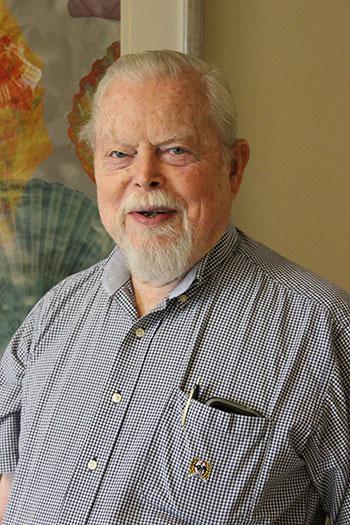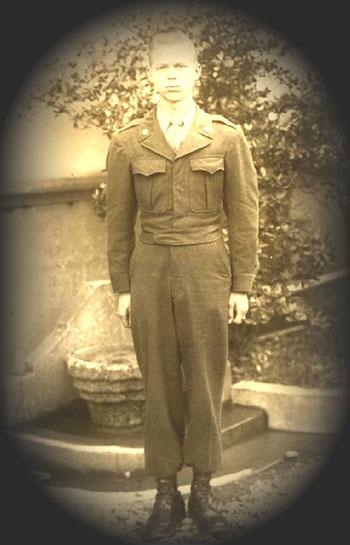

AFRH-W Resident Highlight – Hayes Carlton Larkins
By Lori Kerns, AFRH-G Librarian
Hayes Carlton Larkins was born in Washington, D.C. in the year 1929. His father was a pharmacist’s mate in the Navy and his mother a registered nurse. Because his father was a career sailor, the family moved around quite often. Hayes celebrated his first birthday in Port-au-Prince, where his sister was born. Hayes changed schools ten times before graduating high school. In 1945, he was appointed as a page on the Democratic bench for the U.S. House of Representatives. Later that year, he returned to Marion Military Institute to complete his high school education at the age of 16.
When Hayes was 17, he joined the Army Air Corps for a short enlistment of 18 months. After completing basic training at Amarillo Air Base, he completed surgical technician training in Osaka, Japan. In January 1947, he reported to the U.S. Military Academy Prep School in New York. After failing English, he transferred to Mitchel Field. He soon discharged from the Army after this assignment.
Using the GI Bill benefits, Hayes enrolled at George Washington University. He did not fare so well, so he decided he needed the stricter environment that Marion Military Institute provided. He earned an associate’s degree and was appointed second lieutenant in the ROTC. An officer talked him into going back to active duty. He was sent to Fort Benning, Georgia to complete an associate infantry officer’s course for company grade. Within nine days of going off active duty, he received orders to report back to Fort Benning, where he was assigned to the 78th Combat Engineer Battalion to give new recruits infantry basic training. He applied and got orders for an assignment in Korea. He reported to the 17th Infantry Regiment of the 7th Infantry Division. As infantry platoon Leader in a rifle company of 40 men, he took his men to relieve a ROK (Republic of Korea) company. After three nights, his platoon was attacked. Hayes lost three of his men in the attack. About a month later, he led a platoon in a probing attack on North Korean lines. Of his 35 men, 24 were wounded or died in the attack, including him. Hayes was shot twice and was evacuated to Japan where he stayed for four weeks. Upon his return, he was sent back to Korea to take over the company’s weapons platoon.
In 1952, he was sent back to the States and assigned to the 164th Infantry Regiment of the 47th Infantry Division. He had relatives living within 40 miles of the post. It was through a cousin that he met his future bride, Dora.
After many different assignments, including flight school, Hayes was released from active duty. He then enlisted in the Army for assignment to the Army’s Counter Intelligence Corps (CIC). Upon the completion of his training, he was sent to Denver, Colorado as a CIC Special Agent, where he was promoted to captain in the Army Reserve. While undergoing training, he learned that he was selected for college study. Hayes moved his family to East Lansing, Michigan so that he could attend Michigan State University. Graduating with high honors, Hayes earned a Bachelor of Science degree.
In 1961, with the development of the Berlin Crisis, he received orders to Germany as a CIC Special Agent with the 513th Intelligence Group. After almost three years, he got assigned to instruct at the U.S. Army Intelligence School. Soon after, he applied for the Army Degree Completion Program and was accepted. He conducted research for two months for his thesis and successfully defended his work before an academic committee. He was awarded a master’s degree in 1965. Around this time, the conflict was heating up in Vietnam. By 1966, he received orders for operations of a classified nature. He also did part time work in the corps headquarters in Hue Phu Bai that lasted a year. After these assignments, he returned to the intelligence school to instruct and decided to retire. He ended his 20-year military career on December 31, 1968.
During the last four months of his military service, Hayes had been teaching part time at a community college in Baltimore, MD. Upon his military retirement, he was offered a full time position as an assistant professor at the college. With the college, he would serve as a program coordinator, a department chair, and a division dean. In the 1980’s he began teaching part time at the University of Maryland, in addition to working on a Doctor of Administration in Higher Education degree. Sometime later, he decided that he was not willing to conduct the necessary research and writing to complete his degree. He left the program with an ABD (all but dissertation).
Hayes and Dora have been happily married for 64 years and have raised five children, four daughters and one son. Sadly, his son passed away in 2013. His four daughters have had children, making him a grandfather of eight and great grandfather of two. The family lived in Maryland until 2015 when Hayes and Dora relocated to Gulfport, Mississippi for him to move into AFRH-G. The couple made the decision for him to move to the retirement home so that he would not end up being a burden to his children. Now, he splits his time between AFRH-G and an apartment, where Dora lives. AFRH-G is very proud to have Hayes, a highly educated WWII, Korea, and Vietnam Veteran, among its family!
- Log in to post comments
